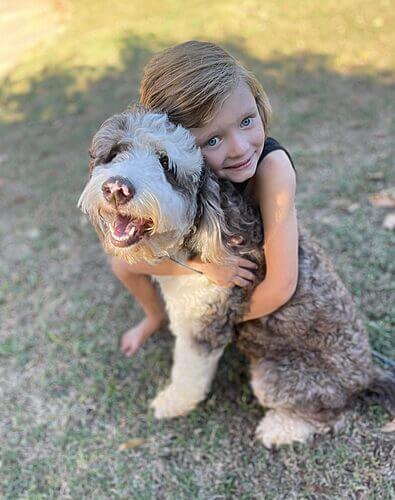Is Your Bernedoodle Behaving Badly? Here’s How to Fix Common Problems

Bernedoodles, with their adorable teddy bear looks and playful personalities, have captured the hearts of many dog lovers. However, even the most charming pup can develop Bernedoodle behavior problems if their needs aren’t met. This informative guide explores the most common behavioral issues faced by Bernedoodles and equips you with the knowledge and tools to address them.
Wondering how to curb Bernedoodle barking, ensure your pup gets the right amount of exercise, or navigate the crucial stage of Bernedoodle socialization? This article delves into these topics and more, offering practical solutions to create a happy and well-adjusted Bernedoodle.
As a responsible Bernedoodle owner, understanding potential Bernedoodle behavior problems allows you to intervene early and establish a positive training foundation. So, let’s dive in and discover how to create a harmonious life with your furry friend!

Common Bernedoodle Behavior Problems
Bernedoodles, a mix between Poodles and Bernese Mountain Dogs, inherit traits from both breeds. While typically intelligent and eager to please, these intelligent canines can exhibit certain behavioral challenges. Here’s a breakdown of some common Bernedoodle behavior problems:

- Barking (Bernedoodle Behavior Problems): Bernedoodles may bark excessively due to boredom, anxiety, alerting you to something new, or seeking attention.
- Chewing (Bernedoodle Behavior Problems): Puppies chew naturally due to teething, but adult Bernedoodles might chew out of boredom, separation anxiety, or a lack of proper chew toys.
- Separation Anxiety (Bernedoodle Behavior Problems): Bernedoodles, bred to be companions, can suffer from separation anxiety when left alone for extended periods.
- Leash Reactivity (Bernedoodle Behavior Problems): Leash reactivity manifests as pulling, lunging, or barking at other dogs or stimuli during walks. Fear, excitement, or frustration can trigger this behavior.
Understanding the root cause behind these Bernedoodle behavior problems is crucial for effective solutions.
Solutions for Bernedoodle Behavior Problems
Fortunately, most Bernedoodle behavior problems can be addressed through consistent training, proper care, and addressing their underlying needs. Let’s explore some key strategies:
Importance of Early Socialization (Bernedoodle Behavior Problems):
Socialization involves exposing your Bernedoodle puppy to different sights, sounds, people, and animals in a safe and controlled environment. This crucial stage helps your pup develop confidence and prevents fear-based reactivity later.

Here are some ways to properly socialize your Bernedoodle puppy:
- Puppy Kindergarten Classes: Many veterinary clinics and pet stores offer puppy socialization classes specifically designed for young dogs. Here are some well-regarded organizations offering puppy socialization classes across the US:
- Puppy Start Right (https://karenpryoracademy.com/courses/puppy-start-right/)
- The Association of Professional Dog Trainers (https://apdt.com/)
- Supervised Playdates: Arrange playdates with well-socialized dogs of similar size and temperament.
- Outings and Visits: Take your puppy on short trips to dog-friendly stores, parks, or outdoor cafes to expose them to different environments.
Positive Reinforcement Training (Bernedoodle Behavior Problems):
Positive reinforcement training rewards your Bernedoodle for good behavior, fostering a positive association with following commands.
Here are some basic positive reinforcement techniques:
- Reward desired behaviors with treats, praise, or toys.
- Use short, clear commands and consistent cues.
- Be patient and consistent with training.
- Consider enrolling in a professional dog training class for personalized guidance.
Importance of Exercise and Mental Stimulation (Bernedoodle Behavior Problems):
Bernedoodles are energetic dogs that require regular exercise to burn off their excess energy. A tired dog is less likely to exhibit destructive behaviors.

Here are some suggestions for mental stimulation through games and toys:
- Interactive puzzles and food dispensing toys.
- Hide and seek games with treats.
- Scent training exercises.
- While discussing training, it’s important to choose the right dog food for your Bernedoodle. A healthy diet with the right amount of protein and nutrients can improve their overall behavior and trainability.
Professional Help (Bernedoodle Behavior Problems):
If you’re struggling to address Bernedoodle behavior problems on your own, seeking professional help from a qualified dog trainer is highly recommended. Certified trainers can assess your dog’s individual needs, develop a customized training plan, and provide valuable guidance. Here are some resources to help you find a reputable dog trainer:
- Dog Care: Bernedoodle behavior problems can often stem from unmet needs. Providing proper dog care, including a nutritious diet, regular exercise, and mental stimulation, is crucial for a well-adjusted pup.
- Dog Health: Underlying health issues can sometimes manifest as behavioral problems. Regular veterinary checkups are essential to rule out any medical causes for your Bernedoodle’s behavior.

Ending FAQ
1. Are Bernedoodles prone to behavioral problems?
Bernedoodles are generally intelligent and eager to please, but like any dog, they can develop behavioral issues if their needs aren’t met. Early socialization, positive reinforcement training, and addressing their exercise and mental stimulation needs are key to preventing problems.
2. What is the best way to stop my Bernedoodle from barking excessively?
Identify the reason behind the barking (boredom, anxiety, etc.) and address the root cause. Positive reinforcement training for desired behavior (being quiet) and providing enrichment activities can help.
3. How much exercise does a Bernedoodle need?
Exercise needs vary depending on age and size. Generally, Bernedoodles require at least one hour of moderate exercise daily, with additional playtime beneficial.
4. Should I crate train my Bernedoodle?
Crate training can be a valuable tool for house training, preventing separation anxiety, and providing a safe space for your Bernedoodle.
Quote about Bernedoodle Behavior Problems:
“A well-behaved Bernedoodle is a happy Bernedoodle, and a happy Bernedoodle is a joy to have around.”
Concluding Remarks
By understanding common Bernedoodle behavior problems and implementing the strategies outlined in this guide, you can create a harmonious and fulfilling relationship with your furry companion. Remember, patience, consistency, and positive reinforcement are key. With dedication and the right approach, you can help your Bernedoodle blossom into a well-behaved and happy member of your family.
Petscaretip – How To Care Your Pets
Address: 809 Dallas St, Houston, TX 77002, USA, Houston, TX, United States, Texas
Email: [email protected]










